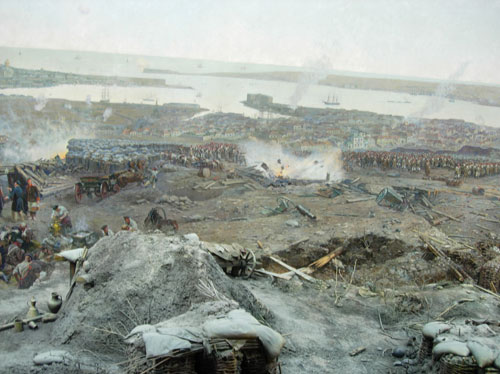
All of the images in this essays are paintings representing the Russian positions at the Battle of Sevastopol
Excerpts from a Surgeon's Report on the 72nd Regiment's Health during the Crimea War
When the regiment left in the Alma steamer for the Crimea on May 22, 1855, it consisted of 30 officers and 607 rank and file. Of the latter, only 320 had been above 4 years in the service: the Corps had not recovered from its severe losses by deaths in the West Indies, and by desertions and discharges in North America.
The Alma arrived in the roadstead of Balaklava on the 29th of May, but did not enter the harbour. The 72nd Regiment remained between decks while members of the 63rd Regiment occupied the orlop deck and crowded forward on the larboard side of the vessel. On the evening of June 1st, the Alma entered the straits of Kertch and anchored above the lower division of the fleet about two miles distant from the short on the Crimean side. The position occupied by the vessel was described as not favourable to health. The water of the straits was dirty and muddy and a faint odour was, at times, perceptible. On the 2nd, a party of men went on shore to draw water, which was bad and earthy. Cholera had been for some time making its way among the regiments in camp, and in the Navy; but the 72nd was, at that time, healthy. On the morning of the 3rd, two cases of cholera occurred. The disease broke out very suddenly. There had been no diarrhoea among the men, or anything whatever to indicate the approach of this outbreak, when on that morning, two men presented themselves with collapsed countenances, and the symptoms of an advanced stage of the disease. These cases came from opposite sides of the ship. They terminated fatally on the same evening.
On the morning of the 4th, a man of the 63rd took ill of the disease and died in sixteen hours; and during the day, two men of the 72nd were attacked, but recovered. On this day the decks were cleared and washed with a solution of chloride of zinc; and the bad water from shore was mixed with some water made from condensed steam on board the ship Tribune. On the 5th, two men of the 72nd died after ten hours of illness. Of these, one was a soldier of thirteen years' service; the other, the best hospital orderly. The latter was a strong, active young soldier, and had been most attentive to the sick. On the day before his attack, while lying in the sick-bay, some one spread over him a blanket which he was subsequently told had belonged to a cholera patient; whereupon, he became very indignant and exclaimed, "I am done for!" Some time afterwards, he became ill, got gradually worse, and sank rapidly towards the end. A third fatal case occurred in the person of a sober and active young serjeant who lingered in a state of low delirium and died after six days' illness. The water is reported to have had a disagreeable appearance, being dirty, but not of bad taste, and when mixed with brandy it became blackish or bluish-black in colour. The Surgeon suggests that this was owing to the presence of iron in the water. The grenadier company was disembarked, and encamped on shore during the night. No case of cholera occurred among these men.
At the first outbreak of the disease, the Surgeon expressed to the commanding officer his belief that the illness was mainly attributable to the crowded state of the ship; and, on the 3rd, accompanied that officer to Head-Quarters at Yenikale, when a representation of the fact was made to the General commanding, and permission requested for the troops to land and encamp on shore; but, as the proposed expedition to Anapa was to sail in a very short time, the General would not assent to this proposal. On the 6th, however, in order that the steamer might be thoroughly cleaned and fumigated, the 72nd Regiment was landed and remained on shore during the day. The weather, unfortunately, was excessively hot, and there was no shade available to afford shelter from the sun. The men and officers bathed, some of them twice, and drank freely of water. A few of the men complained of nausea on their way back to the ship which was reached by 8 p.m. The decks had been thoroughly washed and everything was clean, the hammocks taken down, and the men put on the floors to sleep to allow more free currents of air. No fresh cases occurred during that night. On the 7th, seven men were attacked. Of these, two were completely prostrated at once - voice gone, pulse almost imperceptible, and skin cold as marble. One of them was quite delirious for hours before death; and another fatal case presented a similar appearance of the conjunctiva. Two recovered. During the day, a hot, sultry sirocco wind was blowing, and on board the ship it was almost stifling.
On the 8th, three men were admitted, of whom two died; one after 12 hours and the other after 28 hours of illness. On the 9th, the disease reached its height. Fourteen cases were presented. There being no room in the sick-bay, a sail was hung up, so as to partition off a portion of the left side of the lower deck, where the men might lie. Several patients were collapsed from the first, and these were mostly as before the older men. Many of the cases were very severe. One man lingered on and recovered, though he was prostrated from the first. A Serjeant recovered, and was sent on board the hospital ship Orient, where he died after several days. The day was cooler, and a westerly wind blew fresh. The vessel was moved down alongside another ship, the Royal Charlotte, in order to obtain water, made by condensing steam; and when the anchor was hove, the mud which was stirred up emitted a very offensive odour.
On the 10th, three cases and two deaths occurred. On this day, 15 cases were transferred to the hospital ship Orient, and, on the 11th, at 1 a.m., the vessel sailed for Balaklava. One severe and two slight cases were admitted. No cases occurred on the 12th, on which day the troops were on board the ship in Balaklava harbour. In all, 41 men of the 72nd had been attacked by the disease aboard ship, and of these 23 died.
The regiment landed on the 13th, marched up to the front on the following day, and encamped on the plateau which extends from Inkermann ravine to the lofty cliffs overlooking the bay to the westward of Balaklava. On the 17th, cholera again broke out, and between that date and the 27th, 30 cases were admitted, of which 17 terminated fatally. At the later date, the epidemic ceased, and the numerous cases of bowel complaint which occurred assumed a dysenteric character. Fifty-eight cases of diarrhoea were admitted to hospital during the month.
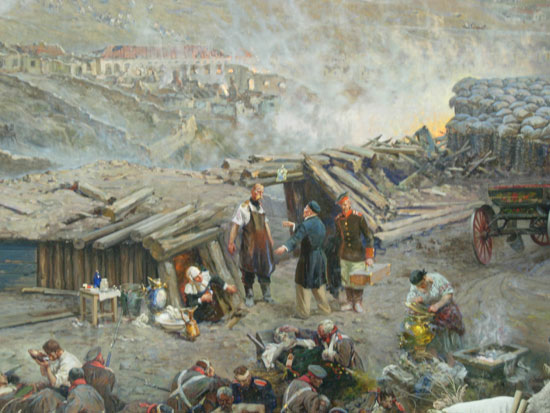
July: On the 18th of July, the camp was moved to a position about a mile distant in the immediate vicinity of the encampment of the Highland Brigade. Bowel complaints were very prevalent during the month but the Regiment was improving very much in health when suddenly cholera appeared a third time amongst the men of a large draft (260 strong) which arrived on the 16th of the month.
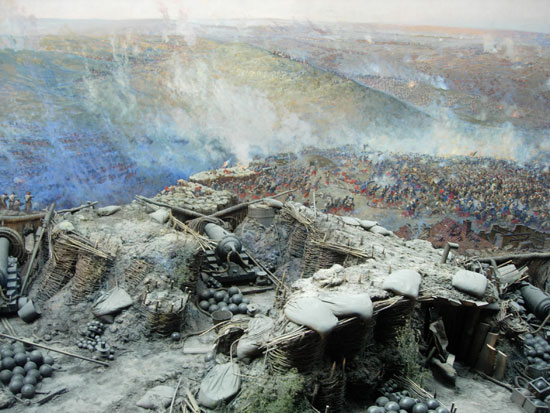
August: Thirty-nine case of cholera were admitted. Of this number, 27 terminated fatally. All cases occurred in men of the draft which had joined in the previous month. After August 15th, the disease entirely disappeared, but many cases of bowel complaint continued to occur. Total admissions into hospital in August amounted to 242 or 31% of the strength.
September: Admissions fell to 70, or 9% of the strength. At the beginning of the month, much dysentery prevailed in the regiment, but towards the end these diseases almost ceased. At the capture of Sebastopol on the 8th, one officer was mortally wounded, one man killed in the trenches, and eighteen non-commissioned officers and men more or less severely wounded.
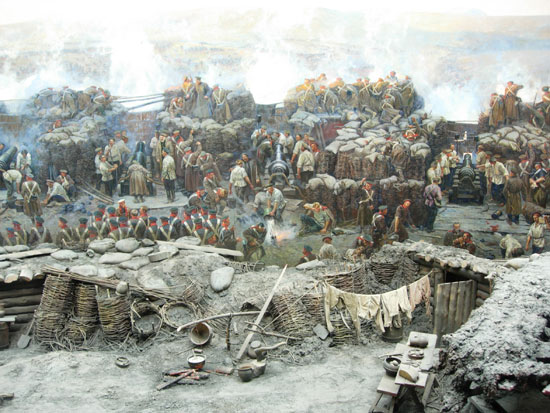
October: The admissions further decreased to 47, or 6% of the strength. The health of the 72nd was remarkably good during the month. This was to be expected, encamped as we were in a good position, well supplied with excellent water, and relieved as we have been from trench and other harassing duties. Bowel complaints have continued to be the most frequent class admitted. The men had healthy employment in digging and levelling ground for, and in erecting huts.
November: On the 12th, the Regiment marched to a new position, about a mile to the south of Kamara, and nearer the sea. The site selected was a good one, sheltered from the prevailing winds, and not too low. By the end of the month the whole of the men, and some of the officers, were hutted; but the sick were still under canvas. A further decrease occurred in the admissions which sank to 38, or 5% of the strength.
December: The men's huts were placed on a gentle slope, protected on every side by hills, and the Hospital huts were also on a well-sheltered spot, a little high up. A good system of drainage was adopted, and proper cooking-houses, latrines, etc. were constructed. The admissions into the hospital amounted to 56 or 7% of the strength. During the remaining period of the Regiment's service in the Crimea, the sickness and mortality were not of sufficient importance to require to be specially detailed.
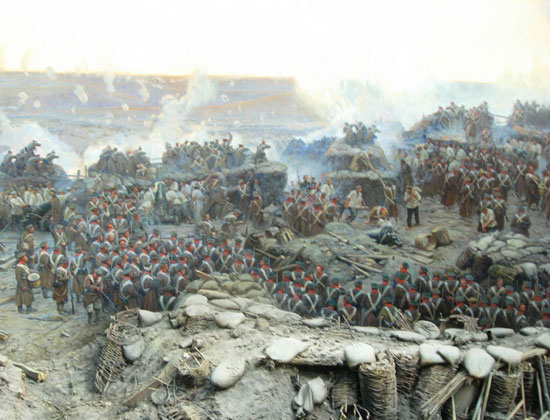
March, 1856: The scale of rations has been as follows: Fresh meat, consisting of beef or mutton, generally four times a week; bread 1.5 lbs. or biscuit 1 lb.; potatoes 8 oz., or onions 4 oz., or compressed vegetables 1 oz; rice 8 oz.; sale 1/2 oz.; pepper 1/32 oz., tea 1/4 oz. or coffee 1 oz.; rum 1/8 gill; lime-juice 1/4 gill, three times a week, and with it 4/5 oz. of sugar. (dw: a gill was 4 fluid ounces.)
The water used by the Regiment in the present encampment is derived from an old Tartar well, and is of most excellent quality and abundant; at times during the summer months, when the Corps was encamped in the front, the water which was obtained from wells was rather muddy, but when placed in barrels sunk in the ground it soon became clear and quite fit for use.
Before the fall of Sebastopol the duty in the trenches, I need hardly say, was very trying: the men never had more than two nights in bed. But during the last six months, the duties have not generally been severe; the fatigue parties, for a short time, when the men were employed bringing up huts from Balaklava, were indeed somewhat heavy, not however to an injurious degree. The men have been well exercised in drill and in marching out; and one company, in rotation, have been out daily at ball-practice. These drills and marches have furnished the men with plenty of healthy exercise, but they have had, in addition, amusements such as football and various athletic games. Intemperance has been less prevalent than when the Regiment has been in garrison quarters.
The 72nd Highlanders proceeded to the Crimea with a strength of 30 officers and 607 men, and was reinforced during its field service by 10 officers and 326 men. Of the 40 officers and 933 men who thus served in the East, five men were killed in action; one officer and seven men died of wounds; 89 men died from disease and accident - 74 of these from cholera. Thirteen officers and 69 men were invalided home.
Sources
Medical and Surgical History of the British Army: To find this document, go to http://books.google.com and enter the search term "72nd highlanders". Look for the link "parliamentary papers" and there's a downloadable document.
As you have already deduced, the causes of cholera weren't fully understood in the 1850s. Here's a link to the essay on: Cholera in 19th century Scotland if you haven't already read it.